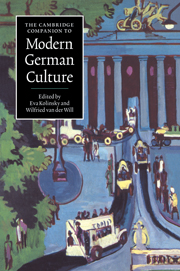Book contents
- Frontmatter
- In search of German culture: an introduction
- 1 The citizen and the state in modern Germany
- 2 German national identity
- 3 Elites and class structure
- 4 Jews in German society
- 5 Non-German minorities, women and the emergence of civil society
- 6 Critiques of culture
- 7 The functions of 'Volkskultur', mass culture and alternative culture
- 8 The development of German prose fiction
- 9 Modern German poetry
- 10 German drama, theatre and dance
- 11 Music in modern German culture
- 12 Modern German art
- 13 Modern German architecture
- 14 German cinema
- 15 The media of mass communication: the press, radio and television
- Index
10 - German drama, theatre and dance
Published online by Cambridge University Press: 28 May 2006
- Frontmatter
- In search of German culture: an introduction
- 1 The citizen and the state in modern Germany
- 2 German national identity
- 3 Elites and class structure
- 4 Jews in German society
- 5 Non-German minorities, women and the emergence of civil society
- 6 Critiques of culture
- 7 The functions of 'Volkskultur', mass culture and alternative culture
- 8 The development of German prose fiction
- 9 Modern German poetry
- 10 German drama, theatre and dance
- 11 Music in modern German culture
- 12 Modern German art
- 13 Modern German architecture
- 14 German cinema
- 15 The media of mass communication: the press, radio and television
- Index
Summary
The significance of Germany's contribution
One might imagine that a nation's lack of a strong tradition in the performing arts would inhibit its ability to develop exciting and internationally acclaimed achievements in theatre and dance in the modern period. However, in the case of Germany, it may be argued that it was precisely because of this lack of tradition that the conditions were created for innovation and experiment, so that over the last hundred years the German-speaking nations have excelled in theatre, dance, opera and dramatic literature, in both theory and practice, in ways that have been both adventurous and influential. The story of modern theatre could not be told without reference to Brecht, nor that of dance without mention of Laban, and these are merely the best-known names of the many practitioners who worked in German-speaking nations to transform the performing arts of this century.
Eighteenth-century Germany had no golden age of theatre to look back on, no Shakespeare, no Racine, no Calderon. The reasons for this were several: for centuries Germany had served as the battleground of Europe; the German language itself was held in low esteem; and, most importantly, Germany did not exist as a nation, comprising in fact several hundred kingdoms, dukedoms, bishoprics, etc., with no major cultural centre like London or Paris.
- Type
- Chapter
- Information
- The Cambridge Companion to Modern German Culture , pp. 213 - 232Publisher: Cambridge University PressPrint publication year: 1999



